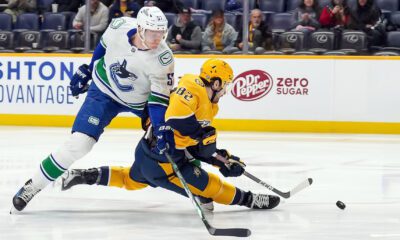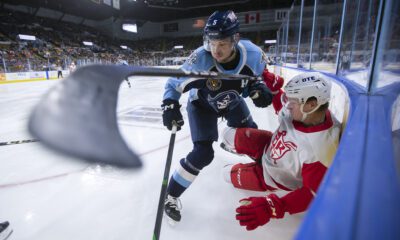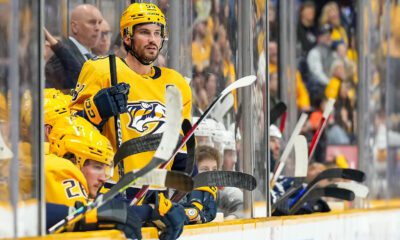Nashville Predators
Nashville Predators 25 Years Later, Part 1: Starting From Scratch
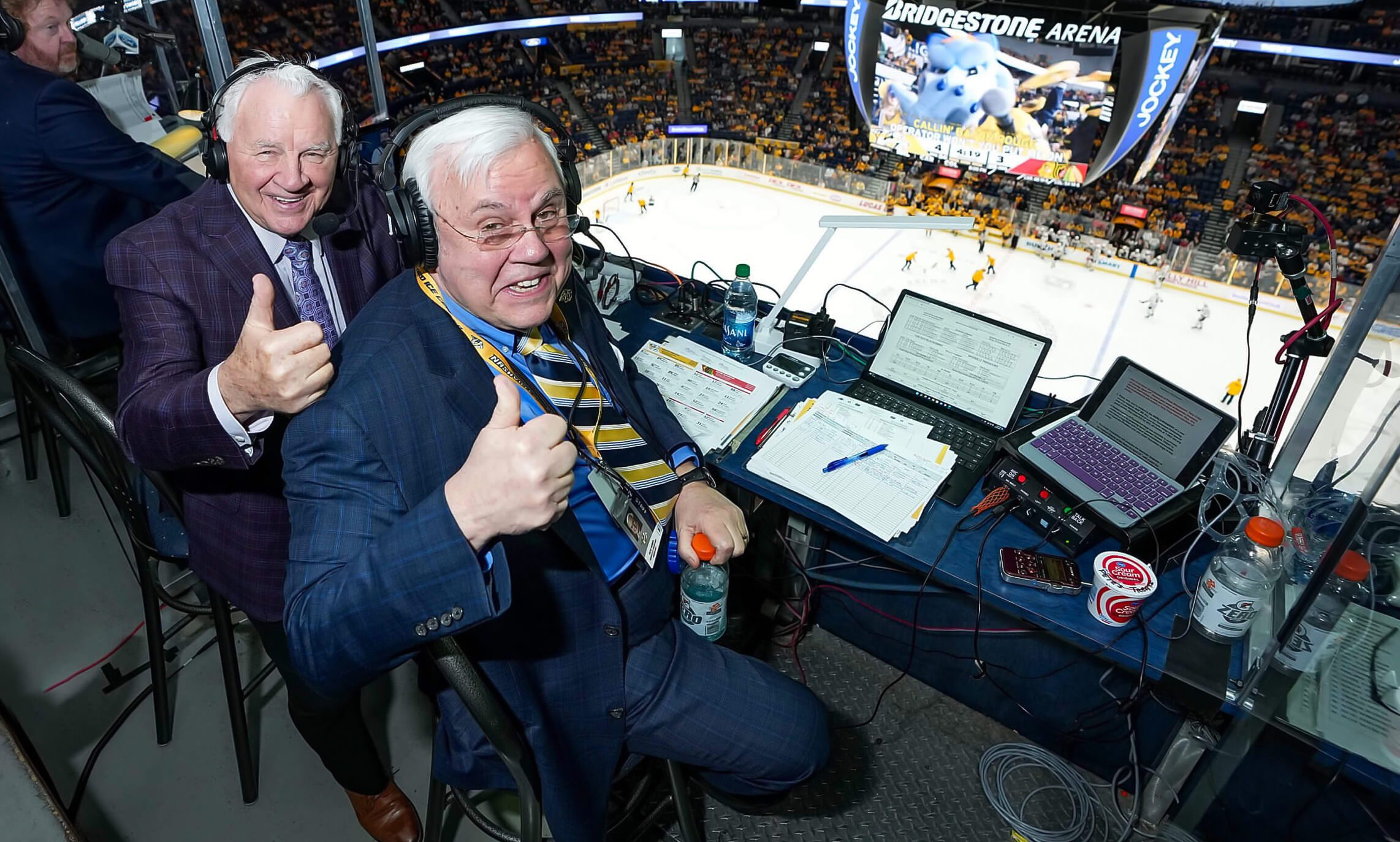
Since their inception, the Nashville Predators have played 2,021 games, including the postseason, and it’s all gone by in a blur.
Bridgestone Arena has become the heartbeat of Nashville at 501 Broadway and has been home to the Predators since they took the ice during their inaugural 1998 season. There have been so many faces that the Predators relied on to help build and grow their fanbase, whether it be broadcasters, coaches, front office staff, and of course, the players.
In Part I of this 25th Anniversary feature, we get some perspective from Nashville’s broadcast team plus a few skaters who were part of the very first team. We will release two more installments during the first month of the 2023 season.
Pete Weber, radio play-by-play voice
Weber was sitting at home reading “Prodigy Sports” when he saw that the NHL had provisionally awarded franchises to Nashville, Atlanta, Columbus, and Minneapolis.
He called downstairs to his wife Claudia and asked her how she felt if they were closer to her family for the holidays. Weber had in-laws in Knoxville and previously had an 11-hour drive to visit with them.
He pursued it, and the rest was history.
“I was aware of the minor league hockey that had been here,” Weber told Nashville Hockey Now. “I knew there would be sticker shock with ticket prices for a market that had not known major league sports. I think the Predators addressed that a bit better than the Tennessee Titans had with PSLs.”
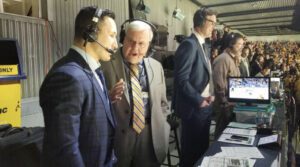

Pete Weber on the air with Jordin Tootoo and Hal Gill. Photo courtesy of Pete Weber
The longtime play-by-play voice always wanted to be part of the “birthing process” of an NHL franchise, and he got his wish. Weber is now entering his 30th season in the NHL, 25 of which have been with Nashville.
Enter partner-in-crime Terry Crisp, who would become Weber’s television analyst after initially starting with former NHL goaltender Mike Greenlay.
Former senior vice president and senior advisor Gerry Helper called in Crisp for the first game, and former president Jack Diller approached the longtime NHLer about staying in Nashville.
Crisp sold his home in Tampa Bay with his wife Sheila and agreed to a three-year deal with the Predators to join Weber in the broadcast booth.
Looking back, Weber says he wishes he had videotaped Nashville over the years as the Predators molded the Volunteer State into a hockey town.
“I wish I could roll back and look at various vistas around 501 Broadway to see how much things have changed,” he said. “It’s still a relatively brief period of time.”
One thing Weber will never forget is the first team that took the ice on Oct. 10, 1998.
Some players had a chip on their shoulder after the expansion draft. Weber recalled a specific moment with goaltender Tomas Vokoun when he was in net against the Philadelphia Flyers on Jan. 11, 1999. Nashville, to that point, had suffered its worst loss in team history after being shutout 8-0.
“He’s back at the scene of his worst previous NHL performance with the Montreal Canadiens and that happened to him again,” Weber said. “Nobody bounced back better than he did. He was just incredible that way.”
The voice of reason behind the bench was Barry Trotz, who went on to win a Stanley Cup in Washington and most recently coached the New York Islanders before being hired as David Poile’s successor as general manager.
Five years after he was a coach in the AHL, Poile gave him a crack to lead an NHL team from its inception.
Poile finished his tenure with Nashville over the summer and is now enjoying retirement. Trotz is now the Predators’ second GM and will have Poile around as an advisor in the meantime.
“You realize how many lessons he’s absorbed,” Weber said. “That to me is showing that the Predators are family. It’s been a family-type thing. I don’t think David Poile could have picked anyone better to succeed him in the job and to bring back the guy who scored the first goal in team history as the coach (Andrew Brunette) was something else again.”
Weber is happy to see the familiarity trend continue with Brunette being named the fourth head coach in team history and replacing John Hynes.
“I think his greatest accomplishment is not the first goal in Predators history, but the last goal that was scored against Patrick Roy to end the playoff series against the Colorado Avalanche,” Weber added.
During Brunette’s road back to Nashville, he was an assistant coach in Minnesota, where the initial owner of the Predators, Craig Leipold, moved to the Wild to take the reins.
“His best learning came while assisting in various capacities with the Wild,” Weber said. “It’s a crazily small hockey universe, I mean unbelievably so.”
Looking to the future Weber, yes, would like to see Nashville win a Stanley Cup, but more importantly, he wants to see a team that continues the passion and expands the fan base.
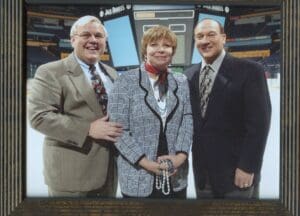

Pete Weber with his wife Claudia and former Voice of the Los Angeles Kings Bob Miller. Weber’s partner with the Kings from 1978-81. Photo courtesy of the Webers.
“The enthusiasm has been more than contagious,” he added. “It has been something that I never necessarily dreamed of coming to fruition and it has. That was manifested best in the spring of 2008 and the spontaneous ovations from the crowd against the St. Louis Blues to make the playoffs.”
As he prepares for his 25th season in a Nashville broadcast booth, Weber has a beholden message to Predators fans.
“Thank you for having fun and keep having that fun,” he said. “It’s up to the franchise to underscore that with a good product on the ice.”
Terry Crisp, former television analyst
After starting the 1997 season 0-6-1, the Tampa Bay Lightning let go of Crisp, who was the team’s head coach. His next job wasn’t behind a bench or in a front office but rather in a booth calling games.
Helper had reached out to Crisp right as the 1998 regular season was starting and an iconic broadcast duo in Nashville was born. Initially, Crisp had only been asked to work the opening game with Weber.
“I sat down beside him, we had a great fun night, the first game and whatnot,” Crips recalled. “At the end, I got up shook his hand and went back to Florida. A couple of days later, I got a call from Gerry and he asked me the same thing. Now he owed me.”
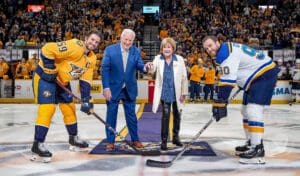

Terry Crisp and his wife Sheila, center, drop the puck during a Nashville Predators game. Photo by John Russell/Nashville Predators
Diller went on to tell Crisp that he’d enjoyed listening to him on the call with Weber and offered him a deal to just do televised games.
Crisp went on to commute from Florida for the rest of the opening season and once it was over, Diller circled back again.
“Jack, give me a three-year deal and we’ll move up there,” a laughing Crisp said. “I phoned Sheila and said to sell the house we’re moving to Nashville. That’s how it happened, one game has turned into 25 years. One of the best moves my wife and I made.”
When Crisp became full-time with the Predators, he’d already been observant of the roster and how they approached their opponents in the early years led by Trotz.
“I think Trotz realized he didn’t have an overabundance of high-level talent, but what he did have was a lot of guys that wanted to prove the other teams wrong,” Crisp said. “The one thing that they gave every night was the effort. No one came here to retire or do whatever. Trotz instilled that in them.”
Crisp was quick to realize too that Cell Block 303 in Bridgestone Arena brought that same level of passion the players did on the ice.
“The team back then listened and knew the Cell Block brought the rest of the rink and the fans into it and what it was all about,” Crisp said.
That same section of fans is present today and continues to get the chants going with 17,000 fans in attendance regularly for home games.
Looking back at what the market was for hockey in Tennessee, Crisp did have episodes of trepidation but never severe enough to think the game didn’t belong in Nashville.
“When I walk through the concourse and I meet grandparents and parents and now their children and they knew Pete and I,” Crisp said. “It feels like we raised a family at times. We’re watching our family grow now. That’s what I have the most pride in, is when I walk through that concourse.”
As Weber’s running mate calling games, Crisp has one way to express his time spent working with the broadcast crew: “FUN.”
“Pete and I are wise,” he added. “We’ve had nothing but fun on this journey coming through it all. If I had to sit back and reflect I would say that we’ve had a lot of fun as families. It still exists today and is alive and well as much as it ever was.”
Willy Daunic, television play-by-play voice
The Predators were searching for someone to do the pre-game and post-game coverage for their broadcasts. Enter Willy Daunic, who has become a familiar face on televisions across the NHL.
He was with 99.7 WWTN back when the radio broadcasts first begun, and since then, Daunic has been covering the Predators. Although, he had to learn the sport as he went, just as the new audience had to.
“I had never done any hockey broadcasting at all,” Daunic said. “I was young and probably a little dumb. I knew a little bit about hockey, but I realized early on that I’ve got a lot of learning to do. I had a willingness to learn and that’s where the opportunity kind of happened. I didn’t have a whole lot of competition, to be honest.”
Daunic sat in section 119 and wore a headset during the game to stay locked in. He was right in the middle of the action, taking in the games just like anyone else would.
A young family got their start in the arena by going to games and getting up on the jumbotron and now they’re all still diehard fans to this day.
The Predators, much like the Daunics, were younger and figuring out how to establish a strong foundation.
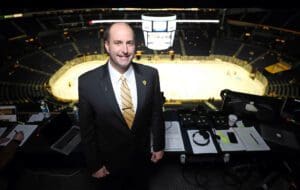

Willy Daunic. Photo by John Russell/Nashville Predators
“It was really a bunch of diamonds in the rough at first,’’ Daunic said. “Barry Trotz and a lot to do with setting the tone and they competed. I think that’s one of the things the crowd really gravitated toward in those early days. I think without that kind of identity I don’t know if it really would have taken flight. It was that underdog work ethic that the crowd really appreciated.”
It would take the Predators until after the 2005 lockout to see players like Paul Kariya and Peter Forsberg come to town. It was the first taste of superstar players for the fans. Just the year prior, Nashville had made the playoffs for the first time.
“I think since then over that time the fanbase started to raise their expectations and they started to get hungry to win championships and playoff series and maybe win the Stanley Cup,” Daunic said. “Then in 2017, they experienced what it was like when you go right to the brink of winning the whole thing. Now, we’re in a whole new era where everybody’s itching to get back to that and it’s not easy.”
Having a passionate fanbase is what the broadcast crew witnessed first-hand as the Predators have gone to the postseason in 15 of their first 24 full seasons. With the itch, it shows the growth of the game in Tennessee and in the eyes of the personnel in the organization that’s needed to have success at the highest level.
As for memories, Daunic pondered for a moment, and in no order, rattled some of the biggest moments in franchise history.
The first was the rally to save the team after it was sold and the Predators had made trades to clear cap space with no true direction as an organization.
“They lost a huge chunk of the production and for that team to come back and make the playoffs with really the franchise and our city hanging in the balance,” he recalled. “It was one thing to have the rally, but then had they tanked and been awful I’m not sure they would’ve survived.
“Because that team was competitive and the new ownership had momentum, the new local ownership who fought to come together and make it work, they had something to go on.”
High on Daunic’s list too was the 2017 Western Conference Quarterfinal sweep of the Chicago Blackhawks. Nashville had won the first two games on the road and Game 3 went to overtime.
“My favorite call since we got to do the games in the first round,” Daunic said. “So when the Predators swept the Blackhawks, Game 3 was the Kevin Fiala overtime winner. That was I think my favorite moment since I’ve been calling the games.”
Daunic says he’s excited about the team’s future as Trotz and Brunette start to take hold of what kind of team they would like to have and build a contender for deep postseason runs.
“Both of them have had great outside perspectives,” Daunic said. “They’ve gone to other markets to see what it’s like and how to win this league.”
As Daunic goes up to the booth for his ninth season doing television broadcasts, he’s appreciative of the fans who built the foundation of the fanbase but also for being patient with him as he had to become the expert he is today on professional hockey.
Trotz told Daunic that Nashville needed that second generation to be fans. That’s how a team knows they’ve struck gold and established themselves for years to come.
“We’re on the second generation of fans,” Daunic said. “The fans had patience with me, especially ones who had come from different markets. Their loyalty and fight to see through the tough times and stick to it when it wasn’t perfect. It took us six years to build a team that was good enough to make the playoffs and they barely made it.
“It took everything they had and those fans had to earn it. That’s what I think is a real core strength of the organization is that first wave of fans. I’ll always be loyal to those guys.”
Jay More, former defenseman (1998-99)
After splitting the 1997-98 season with the Phoenix Coyotes and Chicago Blackhawks, More landed on his feet in Nashville. He signed with the Predators on June 4, 1998, prior to the team’s first game.
More was the second player officially signed to the team behind Marian Cisar, and to Weber’s memory, was the first player to have his jersey on sale.
“I had the expansion experience in San Jose,” more stated. “I played there for the first five years and felt like I was a good fit for the foundation. I got a call from David Poile unexpectedly to gauge my interest. I ended up getting a three-year contract and jumped at the opportunity to come here.”
More knew the Predators would be a group that needed to outwork the opposition. Talent was not a strength of the earliest Predators rosters.
When the Nashville Kats were playing in Gaylord Entertainment Center, More was taken to a game to get a feel for what the atmosphere would be like.
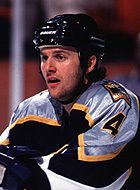

Photo courtesy of Jay More.
“I remember thinking if they can sell this here, then hockey will be a hit,” More said. “We still have a lot of fans from Day 1 today in the arena. The next generation is now going to the games.”
More’s stint as a Predator only lasted 18 games before he suffered a concussion just before Christmas. It was the last time he played in an NHL game.
“Just an innocent little collision that clipped my jaw and rotated my head backward,” More said. “It blacked me out and I could still hear the crowd. I tried coming back a few games later and I played through whatever pain I had. I got hit again and it set me back.
“For the next 18 months, I was nauseous every day and sick to my stomach. I couldn’t really go outdoors. Motion would just make me sick. I remember going to a doctor’s appointment and I lost my car. I sat down on the sidewalk and I cried. I called my wife and I was just an emotional mess, but that’s what concussions can do.”
Some of More’s best friends came from that first Predators team. He developed great relationships with Tom Fitzgerald, Bob Boughner, Cliff Ronning and Scott Walker.
“Fitzgerald and I rode to the rink together every day for practice and games,” he said. “We became close in that short time.”
In More’s eyes, all of the unique personalities were what made the Predators the Predators.
Today, More is still a Nashville-area resident, living in Franklin for the last seven years, where he helps out as a volunteer at the Ford Ice centers in greater Nashville.
“I’m coaching kids now that are the second generation of fans,” More said. “The learn to play program is a fantastic thing the NHL does to promote the game and allow kids to wear new gear. A program like that puts all kinds of kids forward every year.”
Mike Dunham, former goalie (1998-2002)
After being drafted in 1990 by the New Jersey Devils, Dunham finished his time at the University of Maine and then compiled 87 games of time in the AHL before backing up Devils Hall of Famer Martin Brodeur.
Dunham was then notified during the 1998 offseason that he would be left exposed in the expansion draft. He knew three days before the event that Nashville would pick him to be its first net-minder.
“It was a chance for me to establish myself and get some playing time,” Dunham said. “I found out a few days before and flew out to Buffalo. From there, they flew me to Nashville to do a celebration and get to know the area.”
The then 26-year-old moved to his new city in early August prior to the first training camp and bonded quickly with his new teammates once things got rolling.
“We didn’t know what to expect,” Dunham said. “You throw 20 to 25 guys from all different teams in a locker room and you have to bond quickly. That’s one thing Barry did wonderfully was bring the team together and get to know everybody.”
While it was a rushed experience for the first team once the red carpet rolled out, Dunham never looked back.
“I still remember the crowd as we pulled up in limousines,” Dunham said. “The atmosphere and the excitement of hockey finally getting to Nashville at the NHL level. I remember showing up there and it was a sleepy little town. Still enjoy coming back and visiting.”
That evening, Dunham was introduced as the Predators first-ever starting goalie on opening night against the Florida Panthers.
“We were a fast team,” he recalled. “We didn’t have as much experience as the Detroit Red Wings or the St. Louis Blues but we played an up-tempo game. We wanted to sell hockey in Nashville and make it exciting and it’s been good since the beginning.”
Tomas Vokoun was one of Dunham’s first teammates in Nashville and his eventual successor in net. He was a budding goaltender after being taken late in the 1994 draft by the Montreal Canadiens.
“We used to play tennis in the summertime and got along great,” Dunham said. “He was a young kid starting out and I was a little older so it worked out well. When it was time for him to take over they traded me to (the New York Rangers).”
Former goalie coach Mitch Korn was right there at the beginning of the franchise as well. He was with the Predators until June 13, 2014, when his contract expired with the organization. From the start, he was very hands-on as a coach.
“He was very excited, very enthused every day to step out on the ice and make us better goalies,” Dunham said.
Today, Dunham is the development goalie coach for the Boston Bruins. He was lucky enough to step into coaching in 2007 with the New York Islanders as soon as he retired.
“I had my chance to play in the NHL and I lived out my dream, played in three Olympics and what enjoy now is watching other guys succeed and realize their dreams,” Dunham said.
Part of that time in Nashville was also spent with the late Greg Johnson.
“He always had a smile on his,” Dunham said. “He always had time to listen to anything you had to say to him. Very smart and had the answers and was an all-around great person… My memories are all good of him.”
As he reminisced back on his time in Nashville, Dunham remembers the city fondly. He recalls many pleasant memories, including sharing really good meals with his teammates and playing a lot of cards.
“I spent my offseasons in Nashville too,” Dunham said. “I really enjoyed my time there and loved the city and I’m lucky I got to spend so much time there.”
Follow Nick Kieser on Twitter/X: @KieserNick

